4 min read
The future of Brain-Computer interfaces: bridging minds and machines

The realm of brain-computer interfaces (BCIs) stands at the forefront of one of the most exciting and innovative fields of technology today. BCIs, devices that enable direct communication between the brain and external devices, are not just the stuff of science fiction anymore.
They represent a burgeoning field of research that promises to revolutionize how we interact with the technology, offering new hope for individuals with neurological disorders, enhancing human capabilities, and even altering the way we perceive reality.
This article explores the potential future developments of BCIs, the challenges they face, and their implications for society.
The evolution of BCIs
Brain-computer interfaces have evolved significantly since their inception. Early BCIs were rudimentary, often invasive, and limited in functionality. Today, advances in neuroscience, computing and nanotechnology have led to the development of non-invasive BCIs that can read brain signals with remarkable accuracy. These interfaces use electroencephalography (EEG) to detect brainwave patterns and translate them into commands that can control computers, prosthetic limbs, or even virtual avatars.
The promise of BCIs
The potential applications of BCIs are vast and varied. For individuals with paralysis or amputations, BCIs can offer a new lease on life, enabling control of prosthetic limbs or computer cursors with thought alone.
In the medical field, BCIs hold the promise of restoring speed to those who have lost it and offering new treatments for conditions like depression, PTSD, and brain injuries.
Beyond medical applications, BCIs could transform numerous aspects of daily life. Imagine typing at the speed of thoughts, controlling smart home devices with a mere intention, or experiencing virtual reality environments as vividly as the physical world. In the workplace, BCIs could enhance focus, creativity, and communication, breaking down barriers between ideas and their execution.
Challenges and ethical considerations
Despite their potential, BCIs face significant challenges. The accuracy and reliability of non-invasive BCIs need improvement to make them practical for everyday use. Invasive BCIs, while offering greater precision, raise ethical and safety concerns due to the risks associated with brain surgery.
Moreover, the prospect of BCIs raises profound ethical questions. Issues of privacy, consent, and the potential for misuse must be addressed. As BCIs blur the lines between human and machine, they challenge our notions of identity and autonomy.
Who controls the data generated by our brains? Could BCIs lead to new forms of hacking or surveillance? These are questions that society must grapple with as technology advances.
The road ahead
Looking to the future, the development of BCIs will likely focus on improving non-invasive techniques for better accuracy and usability. Advances in artificial intelligence and machine learning could enable BCIs to interpret complex brain signals more effectively, making them more intuitive and powerful.
As BCIs become more integrated into our lives, we may see the emergence of new forms of communication, art, and social interaction. The boundary between human cognition and artificial intelligence could become increasingly blurred, leading to unprecedented collaborations between minds and machines.
Enhancing learning and education
The impact of BCIs on education could be profound. BCIs could be used to monitor student’s attention and engagement, adapting teaching methods in real-time to suit individual learning styles. Moreover, BCIs might enable direct brain-to-brain communication, facilitating new forms of collaborative learning and knowledge transfer.
Charting the future: navigating the promise and challenges of BCIs
The future of brain-computer interfaces is landscape brimming with possibilities. As we stand on the cusp of this technological revolution, it is crucial to navigate the challenges and ethical dilemmas with care and foresight. By fostering a dialogue between scientists, ethicists, policymakers, and the public, we can ensure that BCIs enhance human capabilities without compromising our values or autonomy.
As we bridge the gap between minds and machines, BCIs hold the promise of not just transforming individual lives but reshaping society in ways we are only beginning to imagine. The journey ahead is as daunting as it is exhilarating, but one thing is clear: the future of BCIs is not just about connecting brains to computers, it’s about expanding the horizons of human potential.
